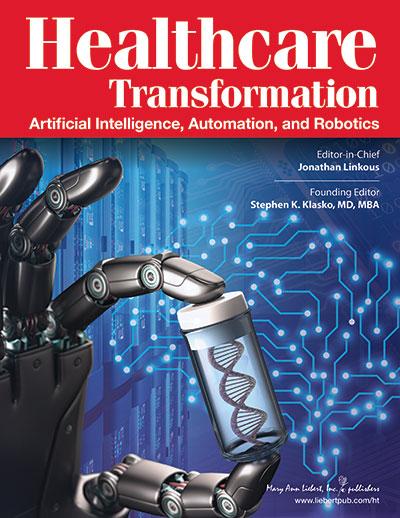
Credit: Mary Ann Liebert, Inc., publishers
New Rochelle, NY, December 18, 2019–Real transformation in healthcare through the adoption of artificial intelligence (AI), robotics, telecommunications, and other advanced technologies could provide significant improvements in healthcare quality, productivity, and access. The current status and future challenges and opportunities for integrating technology into consumer healthcare are discussed in a series of research and opinion articles published in a preview issue of Healthcare Transformation: Artificial Intelligence, Automation, and Robotics, a new peer-reviewed journal from Mary Ann Liebert, Inc., publishers. The launch of the Journal coincides with the first day of the 2019 Partnership for Artificial Intelligence, Telemedicine & Robotics in Healthcare (PATH) Summit in Washington, DC.
Technology such as AI, mobile apps, and wearables have impacted people in areas such as ride sharing, shopping, and entertainment. How can technologies such as these and telehealth, “which have transformed other areas of individuals, families, and communities’ lives, give people the tools to take charge of their health, and to manage their sicknesses?” asks Sharon Terry, Genetic Alliance (Washington, DC) in her Guest Opinion entitled “People at the Center.” She emphasizes the need to keep people and their needs at the center as healthcare transformation through technology continues to evolve.
Ateev Mehrotra, MD, MPH, Harvard Medical School (Boston, MA) and colleagues from Harvard, McLean Hospital (Boston), RAND Corp. (Arlington, VA), and Beth Israel Deaconess Medical Center (Boston) coauthored the article entitled “Characteristics of Organizations that Provide Telemental Health.” Using a random sample of Medicare beneficiaries, they identified the organizations that billed the largest number of telemental health visits. They found that five telemedicine companies provided nearly half (48.3%) of the telemental health visits. Most of the remaining visits were provided by private health clinics (24.3%) and community health centers (14.5%).
The Perspective article “Artificial Intelligence: Lessons Learned from Radiology.” by Elizabeth Krupinski, PhD, Emory University (Atlanta, GA), discusses how AI can help medicine in general, and radiology more specifically. She focuses on AI and computer-aided detection and diagnosis of disease, and how AI can optimize advanced scanning modalities such as CT and MRI. Dr. Krupinski also describes how radiologists perceive AI, presents key challenges and opportunities for applying AI, and discusses where to learn more about AI and radiology.
“Technology can, when used appropriately and embedded within other transformations, result in real, significant, and lasting improvements in access, quality, and efficiencies,” states Jonathan D. Linkous, MPA, FATA, Editor-in-Chief Healthcare Transformation and Co-Founder and CEO of PATH. “Amassing data alone is not a solution.,” he says. “Real transformation is the challenge Healthcare Transformation and PATH hope to achieve.”
###
About the Journal
Healthcare Transformation: Artificial Intelligence, Automation, and Robotics, a breakthrough peer-reviewed journal spearheaded by Jonathan D. Linkous, MPA, FATA, brings together high-quality peer-reviewed research and impactful content dedicated to the advancement of artificial intelligence, automation, and robotics in healthcare, healthcare delivery, education, technology, innovation, and discovery. The Journal serves as a forum to present concepts of the future, debate current models, and provide an invaluable resource of best practices for everyone involved in healthcare and the transformation of healthcare. Healthcare Transformation is the official journal of the Partnership for Artificial Intelligence, Telemedicine & Robotics in Healthcare (PATH). Complete tables of content and a sample issue are available on the Healthcare Transformation website.
About PATH
The Partnership for Artificial Intelligence, Telemedicine & Robotics in Healthcare (PATH) is an alliance of stakeholders working together to improve care and build efficiencies through the use of AI, telehealth, automation, sensors, and robotics. Faced with spiraling costs, increased demands, and decreasing resources, healthcare desperately needs innovation – but innovation alone does not equal adoption or use. PATH and its members are working to gain the support of decision makers, including healthcare providers, regulators, payers, and consumers, to move the field beyond research and pilot projects and lay out a pathway for the integration and use of these advanced technologies in the worldwide ecosystem of medicine. For more information, visit the PATH website.
About the Publisher
Mary Ann Liebert, Inc., publishers is a privately held, fully integrated media company known for establishing authoritative medical and biomedical peer-reviewed journals, including Population Health Management; Telemedicine and eHealth; Cyberpsychology, Behavior, and Social Networking; Big Data; and Games for Health Journal. Its biotechnology trade magazine, GEN (Genetic Engineering & Biotechnology News), was the first in its field and is today the industry’s most widely read publication worldwide. A complete list of the firm’s more than 90 journals, newsmagazines, and books is available on the Mary Ann Liebert, Inc., publishers website.
Media Contact
Kathryn Ryan
@LiebertPub
914-740-2250
Original Source
https:/
Related Journal Article
http://dx.




